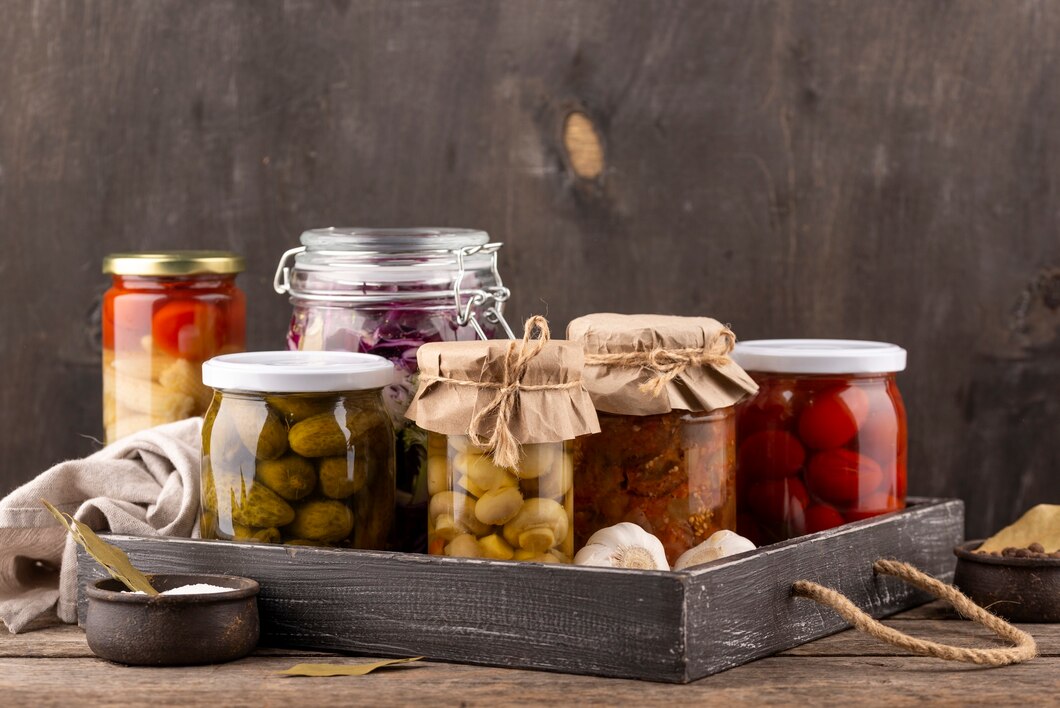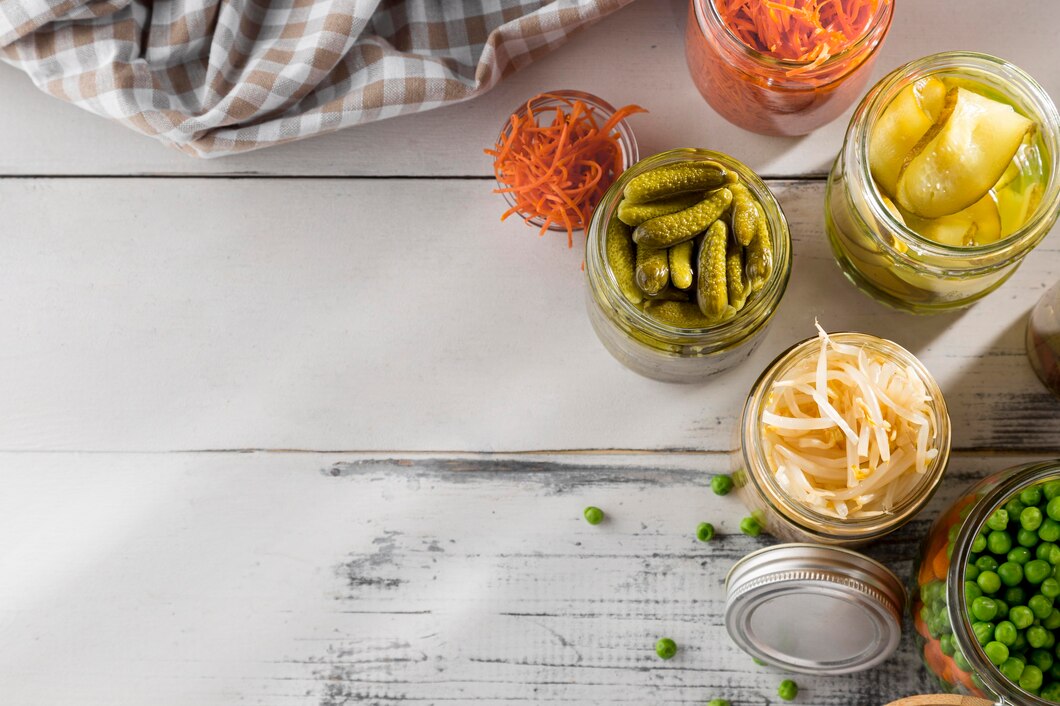How to Improve Gut Health and Immunity with Fermented Foods
Maintaining a healthy gut is crucial for overall well-being. One of the most effective ways to support digestion and immunity is by incorporating fermented foods into your diet. Fermented foods are packed with probiotics. These good bacteria help balance gut microbiota, improve digestion, and support the immune system. This guide explores the benefits of fermented

Maintaining a healthy gut is crucial for overall well-being. One of the most effective ways to support digestion and immunity is by incorporating fermented foods into your diet. Fermented foods are packed with probiotics. These good bacteria help balance gut microbiota, improve digestion, and support the immune system.
This guide explores the benefits of fermented foods, explains the science behind probiotics and immunity, and provides practical tips for incorporating them into your diet for optimal results.
Understanding Fermented Foods and Their Benefits

What Are Fermented Foods?
Fermented foods are made through a natural process. Bacteria and yeast break down sugars and starches, creating helpful compounds like probiotics, vitamins, and enzymes. These nutrients enhance the nutritional value of the food and support gut health.
Common Types of Fermented Foods
- Yoghurt is a dairy product. It is high in Lactobacillus and Bifidobacterium. These strains help with digestion and boost gut health.
- Kefir is a fermented drink made from milk or water. It has many probiotics and yeast that help keep your gut healthy.
- Sauerkraut is a fermented cabbage loaded with beneficial bacteria and digestive enzymes.
- Kimchi is a Korean dish made from fermented vegetables and spices. It’s famous for being good for your gut.
- Kombucha it is a fermented tea containing probiotics, antioxidants, and organic acids that support digestion.
- Miso is a Japanese seasoning from fermented soybeans. It’s rich in probiotics and nutrients.
- Tempeh is a fermented soybean product high in protein and beneficial bacteria.
- Cucumbers fermented in saltwater to make pickles, providing probiotic benefits.
How Fermented Foods Improve Gut Health
Restoring Gut Microbiota Balance
A well-balanced gut microbiome is essential for digestion, nutrient absorption, and overall health. Fermented foods boost good bacteria. This is key after antibiotics or an unbalanced diet.
Key Benefits:
- Increases the diversity of gut bacteria
- Reduces harmful bacterial overgrowth
- Enhances the gut’s ability to absorb nutrients
Pro Tip: Restore gut balance by mixing fermented foods with high-fibre, prebiotic foods. Good options include oats and asparagus.
Aiding Digestion and Nutrient Absorption
Fermentation partially digests food, breaking down complex nutrients into more accessible forms. This improves overall digestion and enhances the absorption of key vitamins and minerals.
Key Benefits:
- Reduces bloating and indigestion
- Supports lactose digestion for those with lactose intolerance
- Enhances the absorption of calcium, magnesium, and iron
Quick Guide: Best Fermented Foods for Digestion
- Yoghurt for daily probiotic intake
- Sauerkraut to relieve bloating
- Miso soup for better nutrient absorption
Reducing Inflammation and Gut Disorders
Inflammation is connected to several digestive issues, such as irritable bowel syndrome (IBS) and inflammatory bowel disease (IBD). The probiotics in fermented foods help reduce inflammation and promote gut healing.
Key Benefits:
- Strengthens gut lining integrity
- Reduces symptoms of bloating, gas, and diarrhoea
- Supports the management of conditions like IBS and Crohn’s disease
Pro Tip: If you have chronic gut issues, try fermented foods. Foods like kimchi and kefir have many probiotic strains.
The Connection Between Probiotics and Immunity
Enhancing Immune System Function
A large part of the immune system is in the gut. This is why a balanced microbiome is key for a strong immune response. Probiotics help control immune cells. They boost the body’s power to fight infections.
How Probiotics Strengthen Immunity:
- Increases the production of immune cells (T-cells and antibodies)
- Prevents harmful pathogens from colonising the gut
- Supports anti-inflammatory responses, reducing the risk of chronic diseases
Quick Guide: Immunity-Boosting Fermented Foods
- Kefir for boosting immunity after illness
- Kimchi for its antibacterial properties
- Miso for antioxidant support
Reducing the Risk of Infections
Probiotics boost the gut barrier. This makes it tougher for harmful bacteria and viruses to get into the bloodstream. Studies show that probiotic consumption lowers the risk of respiratory and gastrointestinal infections.
Examples:
- Yoghurt and kefir reduce the severity and duration of colds and flu.
- Kimchi and sauerkraut contain immune-boosting compounds that enhance infection resistance.
- Miso and tempeh offer antioxidants and probiotics that support immune resilience.
Pro Tip: Eat probiotic-rich foods in the flu season. This can help lower your chance of getting infections.
Supporting Mental Health and Immunity
The gut-brain axis connects digestive health to emotional well-being. Probiotics reduce stress, anxiety, and depression, indirectly strengthening immune function.
Key Benefits:
- Reduces inflammation-related mood disorders
- Enhances serotonin production, linked to improved mood and relaxation
- Lowers stress-induced immune suppression
Quick Guide: Best Foods for Gut-Brain Health
- Kefir for anxiety relief
- Yoghurt for improved mood
- Kombucha to enhance mental clarity
How to Incorporate Fermented Foods into a Gut-Healthy Diet
Start with Small Portions
If you’re new to fermented foods, start slowly. This helps prevent stomach issues.
Examples:
- One to two tablespoons of sauerkraut or kimchi per day
- A small glass of kefir or kombucha
- Half a cup of yoghurt with breakfast
Pro Tip: Increase portions slowly over two to three weeks to allow your gut to adjust.
Pair Fermented Foods with Prebiotics
Prebiotics are fibres that feed beneficial gut bacteria. Combining probiotics with prebiotic-rich foods enhances their effects.
Prebiotic Foods:
- Bananas
- Onions
- Garlic
- Asparagus
- Oats
Eat a Variety of Fermented Foods
Eating various fermented foods helps you get many different probiotics.
Sample Weekly Plan:
- Monday: Yoghurt with fruit and honey
- Tuesday: Tempeh stir-fry
- Wednesday: Kombucha as an afternoon drink
- Thursday: Sauerkraut with a sandwich
- Friday: Miso soup
- Saturday: Kimchi as a side dish
- Sunday: Kefir smoothie
Pro Tip: Rotate fermented foods weekly to maintain a balanced microbiome.
Choose Naturally Fermented Products
Some store-bought fermented products lack live probiotics due to pasteurisation. Look for options that retain beneficial bacteria.
Key Considerations:
- Raw, unpasteurised options
- Labels stating “contains live and active cultures.”
- Homemade fermented foods for maximum probiotic benefits
Quick Guide: Identifying Quality Fermented Products
- Look for “live cultures” on the label
- Avoid pasteurised versions
- Opt for glass jars over plastic packaging
Avoid Excess Sugar and Artificial Ingredients
Flavored yogurts and kombucha often have high sugar levels. This can lower how well probiotics work. Choose unsweetened or minimally processed versions for the best health benefits.
Pro Tip: Always read ingredient labels. Choose products with under 5 grams of sugar per serving.
Frequently Asked Questions (FAQ)

1. How long does it take for fermented foods to improve gut health?
Results can differ, but many people see better digestion and more energy after two to four weeks of regular use.
2. Can I eat too many fermented foods?
Yes, excessive consumption may lead to bloating and gas. It is best to start with small portions and increase gradually.
3. Are fermented foods safe for everyone?
Most people tolerate fermented foods well. People with histamine intolerance or weak immune systems should see a doctor first.
4. What is the best time of day to eat fermented foods?
You can eat fermented foods anytime, but having them with meals helps digestion and nutrient absorption.
5. Can I make fermented foods at home?
Homemade foods like yoghurt, sauerkraut, and kefir are great sources of probiotics. They are simple to make and need just a few ingredients.
Harnessing the Power of Fermented Foods

Adding fermented foods to a gut-healthy diet can greatly improve digestion. Embrace the wonders of fermented foods for a happy gut. These tasty treats can help with digestion, strengthen your immune system, and improve your health. Packed with probiotics, these foods harmonise your microbiome, supporting health today and tomorrow.
Incorporate an array of probiotic-rich treasures like yoghurt, kefir, kimchi, sauerkraut, and miso. Start with small servings; savour the flavours as you journey through options. Enjoy the lasting perks of a balanced gut and a resilient immune system.